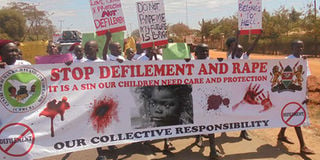Sex pests: 1,200 teachers sacked by TSC

Schoolchildren in Mwingi call for an end to sexual abuse. The Teachers Service Commission said it will not condone teachers who sexually abuse their students. PHOTO | FILE | NATION MEDIA GROUP
What you need to know:
- Some of the teachers who have been dismissed by the TSC get hired by private schools, which do not have a proper mechanism to vet their history.
- The NCCK wants strict adherence to the Children’s Act, especially section 15, which protects children from sexual abuse and exposure to pornography.
School should be a safe and happy place for children, but reports that 1,228 teachers have been sacked in the last seven years because of having sex with learners present a worrying scenario.
Some 1,077 teachers in secondary and primary schools were kicked out between 2010 and 2017, while another 151 were dismissed between last year and this year, according to the Teachers Service Commission (TSC).
The teachers’ employer told Senators on Wednesday that many more cases go unreported because some cultures engender early marriages, while ignorant parents accept hush money from teachers or other school workers.
TSC chief executive Nancy Macharia tabled a report on teenage pregnancies before the Education Committee, chaired by Bomet Senator Christopher Langat, which shows Kakamega County has the highest number of culprits, at 88.
DISCIPLINE
It is followed by Kisii with 61, Homa Bay (60), Kitui (53), Bungoma (47) and Siaya (46). Others are Wajir (1), West Pokot (3), Tana River (4), Nairobi (3), Mandera (1) and Mombasa (4).
Ms Macharia said teachers were responsible for only two percent of pregnancies among learners, adding that local communities were more notorious for preying on schoolgirls.
The commission works with the police to investigate and prosecute the teachers, she said.
“Where offenders are subjected to criminal proceedings, whether ongoing or concluded, the commission always takes up such cases within its disciplinary process as per the regulations in order to weed out paedophiles from the teaching service,” Ms Macharia said.
However, some of the teachers who have been dismissed by the TSC get hired by private schools, which do not have a proper mechanism to vet their history.
Ms Macharia said out of the dismissed 1,228, some 279 teachers had applied for a review of their cases without success.
POLICY
While there are clear guidelines on how teachers should relate with students of the opposite sex, these are largely superficial and hardly adhered to.
Students are, for example, barred from going into teachers’ living quarters while dormitories are out of bounds to teachers of the opposite sex.
“Learners are vulnerable targets owing to their tender age. Thus, adults are more predisposed to taking advantage of them,” Ms Macharia told the committee.
She added that there are instances where perpetrators compromise parents or guardians to keep the affairs secret.
In July last year, the Education ministry released a report that exposed details on the rates of teenage pregnancies, child defilement and drug abuse in schools countrywide.
The report indicated that teenage pregnancies had hit an all-time high — with Narok County leading with more than 60 percent of the reported cases countrywide.
CHILD ABUSE
The sexual harassment report is supported by another study by the United Nations Educational, Scientific and Cultural Organisation (Unesco), which raised a red flag about sexual harassment of learners aged 13 to 17 by teachers in 2016.
Last year, at least 10 girls gave birth while sitting their Kenya Certificate of Primary Education examinations and several others while sitting the Form Four test.
On Wednesday, the National Council of Churches of Kenya (NCCK), the Kenya Conference of Catholic Bishops, the Supreme Council of Kenya Muslims, and the Kenya Christian Professional Forum appeared before the committee and called for concerted efforts to address teenage pregnancies.
Ms Augusta Muthigani, an education commissioner at the Kenya Conference of Catholic Bishops, tabled a report which indicated that between 2015 and last year, 250 cases of child abuse were reported in Malindi Diocese, 21 in Kitale and eight in Homa Bay.
PROSECUTE
She warned against giving learners contraceptives, saying, it would only encourage teenage sex. “We must involve parents in the issue of sex education in schools,” she said.
NCCK Deputy General Secretary Nelson Makanda asked the Senate to demand a report from the Inspector-General of Police on how many instances of teenage and pre-teenage pregnancies had been investigated, how many molesters had been arrested, how many had been charged in court, and how many had been found guilty.
“NCCK recommends that the Senate amends the appropriate laws to provide for stiff punishment of parents, guardians, administrators, police officers, Judiciary officers, or any other persons who facilitate or participate in negotiations aimed at hiding the crime of child sexual molestation by covering it up, facilitating compensation for the parents, or marrying off the girl to the offender or any other person,” he said.
NCCK also wants strict adherence to the Children’s Act, especially section 15, which protects children from sexual abuse and exposure to pornography and other explicit material.
SEX EDUCATION
Dr Langat asked stakeholders to work together to address the crisis, which, he said, is getting out of hand.
He criticised the Education ministry for failing to turn up during the session to explain what it is doing to address the problem.
Religious leaders who attended the forum asked the ministry to vet the curriculum on sex education, saying any teaching that seeks to promote use of contraceptives to students is unacceptable.
Last year, former Education Cabinet Secretary Amina Mohamed set up a team at the ministry’s Directorate of Quality Assurance to carry out research on the extent of teenage pregnancies in schools.





